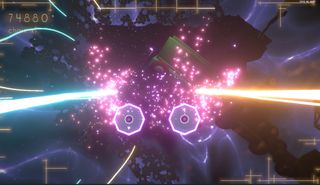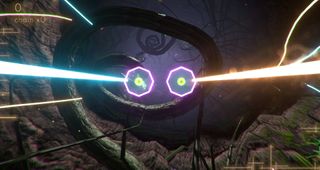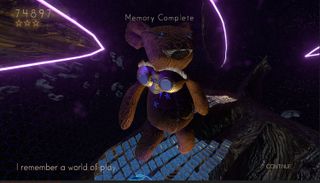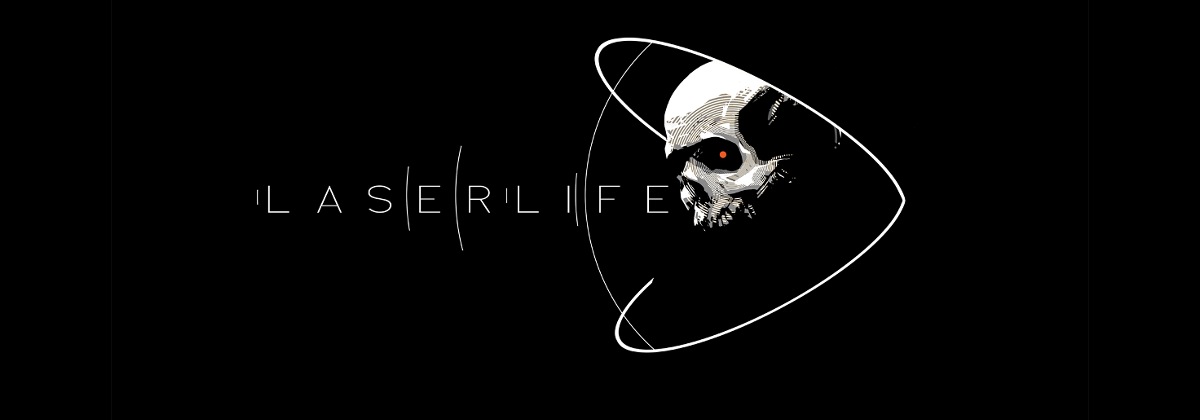12DOVE Verdict
A hypnotic rhythm-game album with a dark and thoughtful mind inside.
Pros
- +
A heartbeat of complex
- +
dark electronic music
- +
Hypnotic
- +
abstract imagery serves an unusual narrative
- +
Focused rhythm mechanics lock you into a trance
Cons
- -
Levels are too strictly structured and formalized
- -
Occasional framerate drops can ruin your streak
Why you can trust 12DOVE
Laserlife, a new music-and-rhythm spectacle from the makers of Bit.Trip, might be misremembered as a Tetsuya Mizuguchi game, given enough years and distance. Though not as powerful in the moment, not as subtly enveloping as bona fide classics like Rez or Child of Eden, it definitely comes from the same wonderful disco-ball planet on which kaleidoscopic music games are born.
The premise of Laserlife is closely infused with your actions, which is to say it’s odd and satisfying in a way that’s not entirely clear. The stranded body of an astronaut, his skull gasping in the vacuum through a shattered helm, has drifted into a massive alien ship. This lonely, expired human is but a bipedal blip in the history of the universe, but the aliens nevertheless succumb to curiosity and begin rebuilding him - not physically, but through memories. As you play through each stage, the gathered moments that define the astronaut, from precious childhood to mysterious demise, materialize in a sort of techno-art gallery dedicated to one human’s life.
In summary: You’re posting on Alien Facebook, and you’re going to like it.

The foot-tapping, thumb-wiggling work of rebuilding a memory goes something like this: you steer a pair of tendril-like neon lasers into the screen, one mapped independently to the left analog stick and the other to the right. Your targets are memory molecules, golden orbs that can only be picked up when you pierce them with a laser and pull the corresponding trigger in tandem with the beat (you can also use the bumper buttons, which the game neglects to mention). After an easy couple of levels get you acclimated to the snaking calligraphy of your lasers - and their eternal pull back toward the center of the screen - it gets more complicated. Purple orbs need to be held and dragged along for a few beats, and green stars must be held, moved, and dropped off on the other side of the screen. It sounds abstract in text, but the game’s visual language is vivid and easy to read in an instant.
There’s a rock-solid and fun mechanical challenge to Laserlife, which acts like an event horizon for your attention. Piloting two separate entities through a delirious assembly of dream-like tunnels is a good hook; gauging the distance of incoming orbs and collecting them with precise timing is what locks you into an enjoyable trance. You’re listening to the dark, thumping, synth-washed music - but no, you’re really LISTENING to it, in a way that you don’t normally listen to music while you work or wait for someone to drop a coffee bean in your $5 cup of milk. I welcome games with good music, but I adore games that give me the chance to really pay attention to it. Laserlife isn’t really about the co-authorship of the music so much as a pleasant decoding of it for a higher score.

With your reflexes focused on piloting The Laser Twins, the morphing environments stream into your peripheral vision, like bits of vague and half-remembered reality passing you by. Sometimes Laserlife does this with understated expertise, slowly changing the tunnel in front of you to an idyllic park, with a distant dogbark drifting in and out of the music seamlessly. Even if you’ve never had a pet, you come away from this moment, with a hazy, stolen memory of one. The end result is an unusual sensation, though a deliberate one that means Laserlife isn’t just randomly eccentric.
Laserlife works hard to balance its button-clicking cadence with evocative imagery, seemingly pulled from an evil-universe Peter Gabriel music video. The balance isn’t consistently maintained, though, and Laserlife’s overall structure weakens it instead of supporting it. Each of the astronaut’s memories is divided in the same way - a stretch of memory collection, then a gorgeous “harmonization” phase in which you only need to steer the lasers through devilishly placed targets. This always ends in a climactic rush through a mercurial tunnel, the last dodge-test of holding on to your score multiplier.

That tells a good musical story, starting with the same bassy growls before hoisting you into a different crescendo for each memory, but the structural repetition staggers the journey. Laserlife can’t help but feel segmented, cased in an overly strict progression rhythm that seems to cut you off - LEVEL’S OVER, THANK YOU - before it can lead you to a moment of tranquility or shock. It feels plotted, not organic and ambiguous like the memories we’re meant to experience. If we go back to Mizuguchi and what separates Laserlife from, say, Child of Eden, then we miss that moment where a space whale transforms into a phoenix. It doesn’t feel like there’s room for such a revelation, because we’re on a schedule.
There are also more boring problems with Laserlife. It doesn’t have input or audio lag adjustment options (enable Game Mode on your TV if you have it), and there are several instances where framerate dips on PS4 mess up your timing. I think the game’s length and price ($14.99) are going to be sore spots too, but I felt jolted by its conclusion only in the way silence signals the end of an album you’ve just been lost in, and now miss. Laserlife’s developers do say they intend for the game to be experienced in about a 2-hour session, and going back to perfect scores on hard difficulty is an alluring proposition.

It’s hard capturing the qualities of Laserlife itself, even when it shares a lineage with cherished games like Rez. These are machines which excel in the periphery of gameplay, which ask for precise input to fuel more important, more nebulous results. They’re about navigating sights and sounds and whatever those awaken inside you. I can say I have fond memories of playing it, though, and maybe that’s all I really want.
Ludwig Kietzmann is a veteran video game journalist and former U.S. Editor-in-Chief for 12DOVE. Before he held that position, Ludwig worked for sites like Engadget and Joystiq, helping to craft news and feature coverage. Ludwig left journalism behind in 2016 and is now an editorial director at Assembly Media, helping to oversee editorial strategy and media relations for Xbox.














